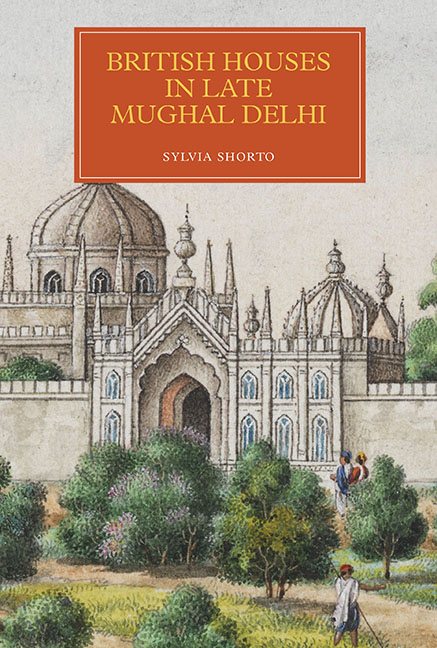Book contents
- Frontmatter
- Dedication
- Contents
- List of Illustrations
- Preface and Acknowledgements
- Abbreviations
- Glossary
- Map
- Chapter 1 Knowledge of Delhi: The Eighteenth Century
- Chapter 2 Hybrid Accommodations: David Ochterlony, the First Residency and the Mubarak Bagh
- Chapter 3 A Lovely Wilderness: Charles Metcalfe and the Garden Houses at Shalimar
- Chapter 4 Truly Fairy Palaces: Robert Smith in Delhi and in Europe
- Chapter 5 The World Displayed: William Fraser and his House on the Hill
- Chapter 6 A Tomb with View: Thomas Theophilus Metcalfe's Dilkusha
- Chapter 7 Dreaming of Home
- Bibliography
- Index
- Miscellaneous Endmatter
Chapter 1 - Knowledge of Delhi: The Eighteenth Century
Published online by Cambridge University Press: 07 July 2018
- Frontmatter
- Dedication
- Contents
- List of Illustrations
- Preface and Acknowledgements
- Abbreviations
- Glossary
- Map
- Chapter 1 Knowledge of Delhi: The Eighteenth Century
- Chapter 2 Hybrid Accommodations: David Ochterlony, the First Residency and the Mubarak Bagh
- Chapter 3 A Lovely Wilderness: Charles Metcalfe and the Garden Houses at Shalimar
- Chapter 4 Truly Fairy Palaces: Robert Smith in Delhi and in Europe
- Chapter 5 The World Displayed: William Fraser and his House on the Hill
- Chapter 6 A Tomb with View: Thomas Theophilus Metcalfe's Dilkusha
- Chapter 7 Dreaming of Home
- Bibliography
- Index
- Miscellaneous Endmatter
Summary
Houses, and the lives that were lived in them, are useful microcosms of history. Both houses and their contents can be used, directly and indirectly, as evidence in interpreting the underlying values and beliefs of the people who commissioned, built or used them. Although houses are more often than not private places, they can help us understand the roles that the individuals associated with them might have played in broader historical chronologies. This book investigates the lives and building activities of five British East India Company officials who were resident in the Mughal capital, Delhi, in the first half of the nineteenth century: David Ochterlony (1783–1825), Charles Metcalfe (1785–1846), Robert Smith (1787–1873), William Fraser (1784–1835) and Thomas Theophilus Metcalfe (1794–1853). Through the vectors of their land transactions, their house-building and their collecting practices, it takes the ‘lives in building’ of these five men as a way to approach a deeper and more nuanced understanding of British attitudes in pre-Revolt Delhi. The study spans the period from 1803 to 1853; that is, from the time of the expulsion of the French-backed Maratha armies and the conquest of Delhi by the British Commander-in-Chief Gerard Lake in 1803 to the sudden death of the British Agent and Commissioner Thomas Theophilus Metcalfe in 1853. This fifty-year span was critical in the history of the already faltering East India Company. Deprived of its trading monopolies in Asia when its charter was renewed in 1813, the Company now assumed more and more of the bureaucratic responsibility for the administration of those parts of India under its control. Focus turned now to ways to derive a greater share of the Company's income from land revenue, and simultaneously British territorial expansion moved beyond Delhi in a slow and steady trajectory overland towards the north and west frontiers of the subcontinent.
I have chosen for this study both private houses and the official Residencies from which Company business was conducted: sometimes the two categories merge into one. The houses can all be securely linked to my five subjects, each of whom served in the military or civil service of the Company and lived and worked in Delhi between 1803 and 1853.
- Type
- Chapter
- Information
- British Houses in Late Mughal Delhi , pp. 1 - 24Publisher: Boydell & BrewerPrint publication year: 2018

